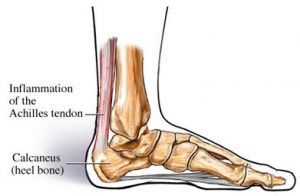Sport Rehabilitation and Physiotherapy for Achilles Tendinopathy

What is Achilles Tendinopathy?
It is a term that encompasses both inflammation (tendonitis) and degeneration (tendinosis) of the thick tendon that connects the calf muscle to the heel.
What Causes Achilles Tendonitis / Achilles tendinosis?
There are several possible contributing factors: Direct trauma, repetitive loading, changes in exercise surface and gradient, poor foot posture (pronation), muscle weakness or imbalance, reduced flexibility, joint stiffness and incorrect footwear.
What are the symptoms of Achilles Tendonitis / Achilles tendinosis?
Pain at the back of the heel particularly when standing on tip-toes or on weight bearing activities. There may be swelling or thickening of the tendon and increased stiffness in the morning.
What will treatment for Achilles Tendonitis / Achilles tendinosis consist of?
Massage – Encompassing a variety of techniques with sufficient pressure through the superficial tissue to reach the deep lying structures. It is used to increase blood flow, decrease swelling, reduce muscle spasm and promote normal tissue repair.
Deep friction – An aggressive massage technique applied across the tissue as deeply as possible to break down scar tissue, restore normal movement and prepare the structure for mobilisation or manipulation. This technique is initially painful but then causes a numbing effect.
Mobilisation – A manual technique where the joint and soft tissues are gently moved by the therapist to restore normal range, lubricate tissues and relieve pain.
Ultrasonic Therapy – Transmits sound waves through the tissues stimulating the body’s chemical reactions and therefore healing process, just as shaking a test tube in the laboratory speeds up a chemical reaction. It reduces tissue spasm, accelerates healing and results in pain relief.
Interferential Therapy – Introduces a small electrical current into the tissues and can be used at varying frequencies for differing treatment effects. E.g. pain relief, muscle or nerve stimulation, promoting blood flow and reducing inflammation.
What other treatments could be used for Achilles Tendonitis / Achilles tendinosis?
Acupuncture – An oriental technique of introducing needles into the skin to increase or decrease energy flow to promote pain relief and healing.
Injection Therapy – A specialist procedure during which a non-harmful steroid and local anaesthetic are injected directly into the injured structure. It has a dramatic effect on removing inflammation and promoting healing.
Taping/Strapping – May be used if thought necessary to restrict abnormal movement and prevent further damage.
What can you do to help Achilles Tendonitis / Achilles tendinosis?
Active Rest – Keep active but avoid aggravate activities particularly weight bearing activities such as running.
Apply an ice pack – For a maximum of 20 minutes. A bag of frozen peas wrapped in a damp cloth works well because it moulds to the shape of the tissues. Ensure that you do not apply ice directly to the skin as this can cause an ice burn.
Exercise programme – This is the most important part of the rehabilitation. Your therapist will instruct you as to which exercises to begin with, when to add the others, as well as how to progress the exercises.
Medication – Ask your GP or Pharmacist for advice on the best medication for your condition.
Footwear – Avoid wearing shoes with a heel tab that may rub the tendon. Shoes with a small heel are better such as trainers.
Podiatry – An analysis of the foot mechanics and structure during walking or running and correction as appropriate.
What if physical therapy does not help or resolve Achilles Tendonitis / Achilles tendinosis?
It is very rare that treatment does not resolve this condition, in these cases we will refer you on for further investigation.
If you think you may have this condition we would love the opportunity to show you our expertise in the treatment and management of this condition so – Please click here for details of how to contact us to book an appointment
If you are unsure whether you have this condition or you would just like to speak to somebody then please get in touch here or call 0161 745 7551 or 0151 515 2323
